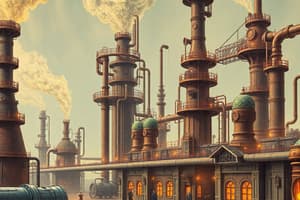Podcast
Questions and Answers
What is the primary purpose of thermal cracking in oil refining?
What is the primary purpose of thermal cracking in oil refining?
- To convert heavy hydrocarbons into lighter hydrocarbons. (correct)
- To combine heavier hydrocarbons into larger molecules.
- To cool down the crude oil for better storage.
- To purify the crude oil using solvents.
Which product is NOT typically associated with the thermal cracking process?
Which product is NOT typically associated with the thermal cracking process?
- Heavy fuel oil (correct)
- Gasoline
- Kerosene
- Diesel
What factor is essential for performing thermal cracking?
What factor is essential for performing thermal cracking?
- High pressure and low temperatures.
- High temperature and high pressure. (correct)
- Low temperature and absence of catalysts.
- Moderate temperature and presence of catalysts.
Which of the following challenges is associated with thermal cracking?
Which of the following challenges is associated with thermal cracking?
Which process follows primary refining to increase the yield of lighter products?
Which process follows primary refining to increase the yield of lighter products?
Flashcards are hidden until you start studying
Study Notes
التكسير الحراري
-
تعريف التكسير الحراري:
- عملية كيميائية تستخدم لتحويل الهيدروكربونات الثقيلة إلى هيدروكربونات أخف.
- تعتمد على الحرارة والضغط لتفكيك الروابط الكيميائية في الجزيئات الكبيرة.
-
أهمية التكسير الحراري:
- يُستخدم لإنتاج وقود عالي الجودة مثل البنزين والديزل.
- يساعد في تحسين كفاءة التكرير وزيادة العائد من النفط الخام.
عمليات التكرير
-
التكرير الأولي:
- فصل مكونات النفط الخام بناءً على نقاط الغليان.
- ينتج عنه منتجات مثل الجازولين، الكيروسين، والديزل.
-
التكسير:
- يتم بعد التكرير الأولي لزيادة كمية المنتجات الخفيفة.
- تشمل تقنيات متعددة مثل التكسير الحراري، التكسير بالعوامل المساعدة (Catalytic Cracking).
-
التكسير الحراري:
- يجرى في درجات حرارة عالية وعادةً في غياب العامل المساعد.
- يمكن أن يحدث في شكل عمليات مستمرة أو دورية.
-
المنتجات الناتجة:
- بنزين، ديزل، غازات سائلة.
- زيوت خام، غازات بترولية مسالة (LPG).
-
التحديات:
- يحتاج إلى معدات مقاومة للتآكل بسبب الحرارة العالية.
- يتطلب استهلاك طاقة مرتفع.
-
التقنيات الحديثة:
- تحسين عمليات التكسير باستخدام تكنولوجيا جديدة لتحسين الكفاءة والعائد.
- استخدام المواد المساعدة لتحسين النتائج وتقليل الانبعاثات.
Thermal Cracking
- Defined as a chemical process that transforms heavy hydrocarbons into lighter hydrocarbons.
- Relies on heat and pressure to break chemical bonds in large molecules.
Importance of Thermal Cracking
- Produces high-quality fuels such as gasoline and diesel.
- Enhances refining efficiency and increases oil yield from crude oil.
Refining Processes
-
Primary Refining:
- Separates crude oil components based on boiling points.
- Results in products like gasoline, kerosene, and diesel.
-
Cracking:
- Follows primary refining to boost the yield of light products.
- Utilizes various techniques including thermal cracking and catalytic cracking.
-
Thermal Cracking:
- Conducted at high temperatures, typically without catalysts.
- Can operate in continuous or batch processes.
-
Products of Cracking:
- Results in gasoline, diesel, and liquefied gases.
- Includes crude oils and liquefied petroleum gases (LPG).
Challenges
- Requires corrosion-resistant equipment due to high temperatures.
- Demands significant energy consumption.
Modern Technologies
- Enhancements in cracking processes through new technologies aimed at improving efficiency and yield.
- Utilization of additives to optimize results and minimize emissions.
Studying That Suits You
Use AI to generate personalized quizzes and flashcards to suit your learning preferences.




